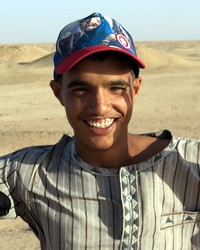In past years, the Tajakant were known as traders and warriors, and held a strong position in the trans-Saharan trade between sub-Saharan Africa and Morocco. They mainly live in Morocco and the Moroccan administered territory of Western Sahara, but some live in Algeria.
The Tajakant tribe was completely nomadic until recent years when the government lured many of them into the city with promises of services and employment. Now they are sedentary, engaged in small-scale trading and farming. Their lifestyle and tribal cultures are mixing with modern western practices. The younger Tajakant people are seeking work opportunities in settled cities or towns. It is not at all unusual to see a younger family living in a modest home in the city with a tent pitched in the back yard where the parents live. Men are more likely to adjust and interact with modern cultures, but women are bound by honor and tradition to stay within the family dwelling. Women sew the tent material for their tents and teach the children about the nomadic Bedouin life of their ancestors. The nomadic Tajakants use sand to wash their hands before Muslim prayers.
The Tajakant people are Sunni Muslims who believe that the One, Supreme God, Allah, spoke through his prophet, Mohammed, and taught mankind how to live a righteous life through the Koran and the Hadith. To live a righteous life, you must utter the Shahada (a statement of faith), pray five times a day facing Mecca, fast from sunup to sundown during the month of Ramadan, give alms to the poor, and make a pilgrimage to Mecca if you have the means. Muslims are prohibited from drinking alcohol, eating pork, gambling, stealing, slandering, and making idols. They gather for corporate prayer on Friday afternoons at a mosque, their place of worship. The two main holidays for Sunni Muslims are Eid al Fitr, the breaking of the monthly fast and Eid al Adha, the celebration of Abraham's willingness to sacrifice his son to Allah. Sunni religious practices are staid and simple. They believe that Allah has pre-determined our fates; they minimize free will. In most of the Muslim world, people depend on the spirit world for their daily needs since they regard Allah as too distant. Allah may determine their eternal salvation, but the spirits determine how well we live in our daily lives. For that reason, they must appease the spirits. They often use charms and amulets to help them with spiritual forces.
As far as we know, the Tajakant community does not have a single Christ follower among them. They put their faith in the power of charms and amulets rather than the sovereign King of kings.
Pray that changes within the Tajakant culture would include the lordship and blessings of Jesus Christ.
Pray for a Christ-ward movement among the Tajakant people that will bless them in every way.
Pray for the Lord to show himself powerful and loving by caring for their physical needs.
Pray for the Holy Spirit to thrust out workers to the Tajakant people.
Scripture Prayers for the Tajakant in Western Sahara.
https://en.wikipedia.org/wiki/Tajakant
https://books.google.com/books/about/A_Western_Saharn_Clerical_Tribe_the_Taja.html?id=pHECtAEACAAJ
https://missionomission.org/2017/03/20/the-nation-of-the-tajakant/
| Profile Source: Joshua Project |










